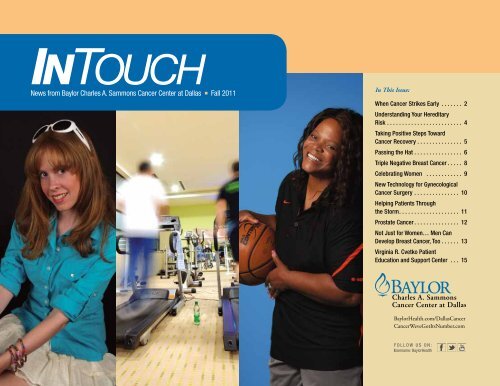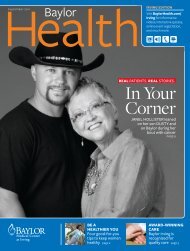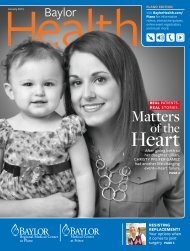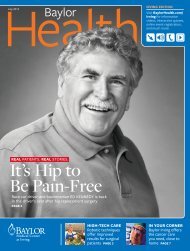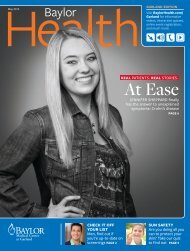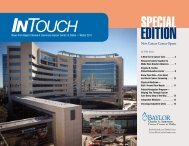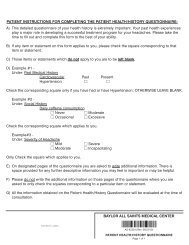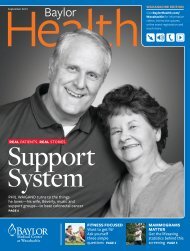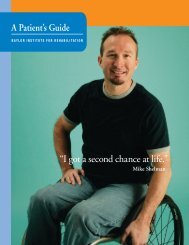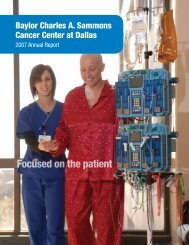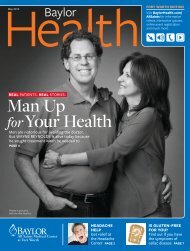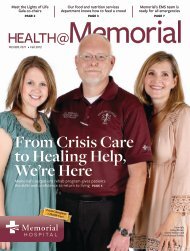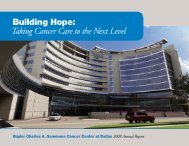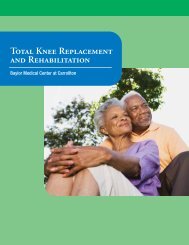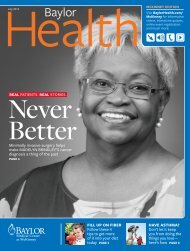Fall 2011 - Baylor Health Care System
Fall 2011 - Baylor Health Care System
Fall 2011 - Baylor Health Care System
You also want an ePaper? Increase the reach of your titles
YUMPU automatically turns print PDFs into web optimized ePapers that Google loves.
INTOUCH<br />
News from <strong>Baylor</strong> Charles A. Sammons Cancer Center at Dallas n <strong>Fall</strong> <strong>2011</strong><br />
In This Issue:<br />
When Cancer Strikes Early ........ 2<br />
Understanding Your Hereditary<br />
Risk.......................... 4<br />
Taking Positive Steps Toward<br />
Cancer Recovery................ 5<br />
Passing the Hat ................. 6<br />
Triple Negative Breast Cancer...... 8<br />
Celebrating Women ............. 9<br />
New Technology for Gynecological<br />
Cancer Surgery................ 10<br />
Helping Patients Through<br />
the Storm..................... 11<br />
Prostate Cancer................ 12<br />
Not Just for Women… Men Can<br />
Develop Breast Cancer, Too....... 13<br />
Virginia R. Cvetko Patient<br />
Education and Support Center .... 15<br />
<strong>Baylor</strong><strong>Health</strong>.com/DallasCancer<br />
CancerWeveGotItsNumber.com
When Cancer Strikes Early<br />
Young Adults Face Difficult Issues When Recovering from a Diagnosis<br />
Crystal Griffith was trying to be a supportive friend.<br />
She had just graduated from college and was starting a<br />
career and her young adult life. A younger friend confided<br />
that a suspicious spot was found on her breast as<br />
part of her annual gynecologic exam. She asked Griffith<br />
to accompany her to the biopsy.<br />
“I was scared for her and I wanted to help,” says<br />
Griffith. “But I also was thinking, ‘Here I am older<br />
than her and I have never had a yearly exam.’ I got a<br />
funny feeling about it, but that feeling turned to fear<br />
when I felt a lump myself two weeks later. I would<br />
never have had the courage to go in, but seeing my<br />
friend go through it, I knew what I had to do. I scheduled<br />
an appointment with my doctor right away.”<br />
Thankfully, Griffith’s friend’s biopsy results were<br />
benign. However, Griffith was not so lucky. At age 25,<br />
she was diagnosed with breast cancer. “I told my friend<br />
she had saved my life,” says Griffith.<br />
2<br />
After surgery, 16 rounds of chemotherapy and 35<br />
rounds of radiation therapy, she is once again moving<br />
on with her life. “I had to take a year off of my life to<br />
do all this,” she says. “But now I have accepted it and<br />
am feeling more confident.”<br />
Young Adult Cancer Survivors<br />
Cancer is usually considered a disease that affects older<br />
people. According to the American Cancer Society<br />
(ACS), more than 1.5 million cases of cancer will be<br />
diagnosed in the United States in <strong>2011</strong> and 78 percent<br />
of those cases will occur in people who are middle aged<br />
or older. But cancer can occur at any age. The diagnosis<br />
can be a mental and physical challenge. For those like<br />
Griffith, diagnosed at a young age, the journey can also<br />
include added challenges and considerations that may<br />
last their lifetime.<br />
“These people are just starting their lives,” says Phyllis<br />
Yount, LCSW, MSW, senior social worker at <strong>Baylor</strong><br />
University Medical Center at Dallas. “They have so<br />
many questions beyond their medical care. Sometimes<br />
they are just beginning their careers or haven’t even<br />
begun yet and have limited or no insurance. They have<br />
concerns about their careers and legal questions and<br />
wonder about relationships, marriages and future<br />
fertility issues.”<br />
Handling these issues and the emotions that come with<br />
a cancer diagnosis at an early age is often helped by<br />
finding other young adults who can relate to the cancer<br />
journey. “One of my biggest issues was not having anyone<br />
else my age to talk to,” says Griffith. “I would walk<br />
into the chemo room and it would be full of people my<br />
grandparents’ age. All my friends were on Facebook ©<br />
discussing the color of their bridesmaids’ dresses or<br />
their recent job promotions. Instead, I was wondering,<br />
‘Am I going to be here next year’ ‘Am I going to get<br />
married’ ‘Am I going to be able to have kids’”
<strong>Baylor</strong> Charles A. Sammons Cancer Center at Dallas<br />
helps Griffith and other young cancer survivors connect<br />
and find support for their specific needs in several ways:<br />
• A Facebook © page designed specifically for young<br />
adult cancer survivors (see sidebar for more<br />
information.)<br />
• An annual young adult cancer survivor’s forum<br />
hosted by <strong>Baylor</strong> Sammons Cancer Center’s Virginia<br />
R. Cvetko Patient Education and Support Center.<br />
Each year, experts address topics relevant to these<br />
cancer survivors including legal, employment, insurance<br />
and other issues.<br />
• A new support group for young breast cancer<br />
survivors formed by Griffith in collaboration with<br />
the Cvetko Patient Education and Support Center.<br />
My Pink Peeps (mypinkpeeps.com) allows young<br />
women to share online support and meet periodically<br />
in social settings.<br />
“To serve these survivors in the best way possible, we<br />
want to meet them where they are,” says Yount. “Often<br />
they are each others’ best sources of information and<br />
support. We are here to help in any way possible.”<br />
“<strong>Baylor</strong> Sammons Cancer Center’s Cvetko Center is<br />
dedicated to helping educate and support cancer<br />
patients at all stages of life,” says Pam Carnevale,<br />
MHSA, manager of the Cvetko Center. “Understanding<br />
the special needs and challenges these younger<br />
patients face is so important and we appreciate the<br />
opportunity to help.”<br />
“We all need support through this journey and it has<br />
definitely given me a better appreciation for life,” says<br />
Griffith. “If I can find a way to help someone else, then<br />
it can allow me to turn this difficult experience of my<br />
own into something positive. It’s a lesson I’ve been<br />
learning this past year—sometimes we can’t control<br />
what happens to us in life, but we can take control of<br />
how we respond.”<br />
Young Adult Cancer Survivors<br />
Can Now “Friend” Others<br />
A group is now active on Facebook © where young<br />
adult survivors can offer and receive emotional<br />
support, education and social interaction.<br />
“Young adults who have survived cancer often<br />
face a unique set of challenges,” says Phyllis<br />
Yount, LCSW, MSW, senior social worker at <strong>Baylor</strong><br />
University Medical Center at Dallas. “They wonder,<br />
‘Should I tell my employer Will I be able to have<br />
children Can I get life insurance’ The answers to<br />
these questions and many more lie within others<br />
who have shared their experience. What better<br />
place to network with other young adults than<br />
through Facebook © ”<br />
If you’re interested in joining the group, visit<br />
Facebook.com and search “Young Adult Cancer<br />
Survivors” or go to http://on.fb.me/yacsonfb.<br />
Become a fan of the <strong>Baylor</strong> <strong>Health</strong> <strong>Care</strong> <strong>System</strong><br />
page on Facebook © while you’re there:<br />
Facebook.com/<strong>Baylor</strong><strong>Health</strong>.<br />
For more information about <strong>Baylor</strong> Sammons<br />
Cancer Center’s cancer survivor support programs<br />
and educational services, please call the Cvetko<br />
Center at 214.820.2608 or visit<br />
<strong>Baylor</strong><strong>Health</strong>.com/Cvetko.<br />
Crystal Griffith, breast cancer survivor<br />
3
Understanding Your Hereditary Risk<br />
Can Help Detect Cancer Early<br />
One of the most significant breakthroughs in cancer<br />
research is the ability to identify genetic changes or<br />
mutations that can possibly contribute to the development<br />
of certain types of cancer. These mutations can<br />
be passed through families and when patients have<br />
a mutation, their risk of developing certain cancers<br />
increases dramatically. If you have a personal or family<br />
history of cancer (most commonly breast, ovarian and<br />
gastrointestinal cancers) advanced testing to determine<br />
the presence of these genes can lead to more frequent<br />
monitoring and if problems do develop, early<br />
treatment.<br />
<strong>Baylor</strong> Charles A. Sammons Cancer Center at Dallas<br />
offers the Cancer Genetics program to help determine<br />
if you are at risk for one of the genetic mutations that<br />
can lead to cancer. Laura Panos, MS, is the genetic<br />
counselor who works with patients who have a family<br />
and/or personal history of cancer, to better determine<br />
their personal potential risk. “If someone has a family<br />
history of cancer they are often referred for genetic testing,”<br />
says Panos. “We then take a very detailed family<br />
and medical history and when appropriate do the<br />
blood testing for the genetic mutations.”<br />
You may want to seek a genetics-risk assessment if you<br />
have a personal or family history of:<br />
• Cancer at an unusually young age<br />
• Multiple types of cancer in one individual<br />
• Rare forms of cancer<br />
• A family history of similar cancers<br />
Common family histories that are suggestive of a<br />
genetic syndrome are:<br />
• Family history of breast and/or ovarian cancer<br />
• Family history of colon and/or uterine cancer<br />
• Personal history of polyposis (many polyps in the<br />
colon)<br />
• Family history of endocrine tumors<br />
This testing can be especially important for someone<br />
who has been diagnosed with breast cancer. “When a<br />
woman has been recently diagnosed with breast cancer,<br />
we move quickly because treatment decisions can be<br />
dependent upon gene mutation status,” says Panos.<br />
“If we determine a woman with cancer tests positive for<br />
the breast cancer susceptibility gene (BRCA), she may<br />
opt for a double mastectomy (bilateral mastectomy) as<br />
opposed to a single mastectomy (unilateral mastectomy)<br />
or lumpectomy as a preventive measure against future<br />
cancers. It also gives her and her physician the opportunity<br />
to begin more frequent screening to spot any<br />
other problems early. Testing other family members for<br />
genetic mutations can help them determine their risk<br />
of cancer as well.”<br />
R<br />
Laura Panos, MS, genetic counselor<br />
For more information about <strong>Baylor</strong> Sammons Cancer<br />
Center Cancer Genetics program, call 214.820.9600<br />
or visit <strong>Baylor</strong><strong>Health</strong>.com/DallasGenetics.<br />
4
Recovering from cancer takes more than just advanced<br />
medicine. Research shows staying as physically active as<br />
possible also can help patients mentally and physically<br />
recover. <strong>Baylor</strong> Charles A. Sammons Cancer Center<br />
at Dallas offers Fit STEPS for Life ® (FSFL), a free<br />
individualized exercise program for people living with<br />
cancer.<br />
“Exercise is so important to cancer recovery,” says Joyce<br />
O’Shaughnessy, MD, medical oncologist on the medical<br />
staff at <strong>Baylor</strong> University Medical Center at Dallas<br />
who treats breast cancer patients. “It is important for<br />
everyone, but specifically for breast cancer patients,<br />
exercise has been shown to lower some of the drivers<br />
of breast cancer recurrence such as estrogen and insulin<br />
levels.”<br />
A specially equipped exercise room for cancer patients<br />
is available through the Oncology Outpatient Clinic in<br />
suite 250 of <strong>Baylor</strong> Sammons Cancer Center. Patients,<br />
referred by their physician for the exercise program,<br />
can begin at any time during their treatment and<br />
recovery process. “It all depends on their needs,” says<br />
Kathy Kresnik, clinical exercise specialist with FSFL.<br />
“If a patient is undergoing physical therapy, we will<br />
work in collaboration with other areas such as cardiovascular<br />
health. The goal is to assist in recovery from<br />
cancer surgery. We help those with lymphedema after<br />
breast cancer surgery not to overdo it, but regain and<br />
strengthen their mobility and range of motion in their<br />
upper body.”<br />
At their initial appointment, Kresnik assesses the<br />
patient’s medical history, conditioning level and fitness<br />
goals. “We set goals, keeping in mind that during<br />
treatment people have good and bad weeks,” she says.<br />
“Sometimes we will cut back and not see the progress<br />
Taking<br />
Positive Steps<br />
Toward Cancer<br />
Recovery<br />
we want, then we can work to build back up. We work<br />
to help minimize the effects of chemotherapy and<br />
radiation.”<br />
In addition to the physical benefits, the FSFL program<br />
also offers mental benefits. “Cancer survivors, their<br />
spouses and caregivers also enjoy visiting with each<br />
other here,” says Kresnik. “They understand each other<br />
in a way no one else can.”<br />
Dr. O’Shaughnessy has also seen the benefits in her<br />
own patients. “I am a strong advocate for this exercise<br />
program,” she says. “I encourage all patients to ask<br />
their doctor for a referral.”<br />
<strong>Baylor</strong> is researching the effects of exercise on cancer<br />
patients through FSFL and has found:<br />
• Exercise can improve the survival rate for colon and<br />
breast cancer survivors up to 50 percent.<br />
• Physical fitness enables patients to remain independent<br />
during disease treatment and beyond.<br />
• Exercise can ease the side effects of chemotherapy<br />
including compromised physical and mental function,<br />
nausea, fatigue and depression.<br />
• Physical conditioning can diminish the effects of<br />
most chronic diseases that can coexist with cancer<br />
such as diabetes, hypertension, heart disease, lung<br />
disease, obesity and arthritis.<br />
<strong>Baylor</strong> Sammons Cancer Center’s FSFL program is<br />
open from 9 a.m.–5 p.m. Monday through Thursday.<br />
For more information, call 214.820.2608 or<br />
visit <strong>Baylor</strong><strong>Health</strong>.com/DallasCancer.<br />
5
Passing the Hat<br />
The opportunity to talk with others sharing similar<br />
experiences is just as valuable as the reward of giving to<br />
others. “We are doing a nice thing, but we really have<br />
fun too,” says Miller. “Our conversations are not always<br />
cancer related. We talk about nutrition and everything.<br />
We have fun with it.”<br />
Miller also is a personal trainer and fitness practitioner<br />
so she ends each session with stretching exercises.<br />
“Fitness and flexibility are important for everyone,<br />
especially cancer patients and survivors,” says Miller.<br />
“While knitting is relaxing, muscles can tighten up<br />
when you are working on a project. We stretch and<br />
loosen those tight muscles.”<br />
T<br />
There is something therapeutic about knitting. Just ask<br />
the women who meet twice a month in the Virginia R.<br />
Cvetko Patient Education and Support Center to knit<br />
hats for people undergoing cancer treatments. These<br />
women know how important these hats can be because<br />
they, too, are cancer survivors.<br />
Passing the Hat is a group of knitters begun by Ellen<br />
Miller, a long-time knitter and wife of Alan Miller, MD,<br />
PhD, chief of oncology for <strong>Baylor</strong> <strong>Health</strong> <strong>Care</strong> <strong>System</strong><br />
and medical director of <strong>Baylor</strong> Charles A. Sammons<br />
Cancer Center at Dallas. For more than 30 years, she<br />
had been knitting hats and donating them to homeless<br />
shelters. She has now turned some of her efforts to the<br />
cancer survivors she meets at <strong>Baylor</strong>.<br />
6<br />
“I knitted some hats for a friend’s daughter who had<br />
cancer and realized with the wonderful programs at the<br />
Cvetko Center, I could teach survivors how to knit for<br />
those in chemo,” says Miller. “It is a wonderful way<br />
to help both the survivors and those currently in<br />
treatment.”<br />
Miller says she started the knitting group by teaching<br />
participants to knit with needles—the “old-fashioned<br />
way,” she calls it. Then one woman brought in a knitting<br />
loom and the method became popular. “Cancer<br />
treatment can sometimes affect dexterity,” she says.<br />
“This helped them be more comfortable with the<br />
knitting.”<br />
The Passing the Hat creations are available free of<br />
charge to chemotherapy patients at <strong>Baylor</strong> Sammons<br />
Cancer Center. The program is open to anyone, but<br />
pre-registration is encouraged so enough looms are<br />
available. Donations of soft yarn and adult-sized looms<br />
are also appreciated. To register, donate or for more<br />
information, please call 214.820.2608.
InTouch<br />
InTouch is a publication of <strong>Baylor</strong> Charles A. Sammons Cancer Center<br />
at Dallas. InTouch provides information about cancer: prevention,<br />
screening, diagnosis and treatment options. It also provides information<br />
to patients and their caregivers to help manage the challenges<br />
of cancer through educational and support programs and events,<br />
sponsored by <strong>Baylor</strong> Sammons Cancer Center.<br />
Advisors/Editors<br />
Alan M. Miller, MD, PhD<br />
Chief of Oncology, <strong>Baylor</strong> <strong>Health</strong> <strong>Care</strong> <strong>System</strong><br />
Medical Director, <strong>Baylor</strong> Sammons Cancer Center<br />
C. Allen Stringer, MD<br />
Medical Director, Virginia R. Cvetko Patient Education<br />
and Support Center<br />
Sylvia Coats<br />
Director of Administration<br />
<strong>Baylor</strong> Sammons Cancer Center<br />
Pam Carnevale, MHSA<br />
Manager, Virginia R. Cvetko Patient Education and Support Center<br />
<strong>Baylor</strong> Sammons Cancer Center<br />
Cynthia Robinson-Hawkins, MBA, RN<br />
Manager, Patient Navigation Program,<br />
<strong>Baylor</strong> Sammons Cancer Center<br />
Andrée Bourgeois<br />
Director, Marketing/Public Relations<br />
<strong>Baylor</strong> University Medical Center at Dallas<br />
Rosanna Sandlin<br />
Senior Marketing and Public Relations Consultant<br />
<strong>Baylor</strong> University Medical Center at Dallas<br />
Helpful Phone Numbers<br />
<strong>Baylor</strong> Sammons Cancer Center 214.820.3535<br />
BE THE MATCH ® 214.820.4279<br />
Ernie’s Appearance Center 214.820.8282<br />
Oncology Outpatient Clinic 214.820.6767<br />
Patient Navigation Program 214.820.3535<br />
Texas Oncology 214.370.1000<br />
Virginia R. Cvetko Patient Education<br />
and Support Center 214.820.2608<br />
W. H. & Peggy Smith Breast Center 214.820.9600<br />
Comments on this issue or suggestions for future issues should be sent<br />
to: InTouch, <strong>Baylor</strong> Sammons Cancer Center, 3410 Worth Street, Suite<br />
200, Dallas, Texas 75246, 214.820.2608.<br />
Accreditations and Awards<br />
<strong>Baylor</strong> Charles A. Sammons Cancer Center at Dallas holds<br />
accreditations from some of the most prestigious cancer organizations<br />
in the nation. Each of these accreditations requires programs to<br />
achieve specific standards of excellence.<br />
Magnet Award for “Excellence<br />
in Nursing” from the American<br />
Nurses Credentialing Center<br />
National Accreditation<br />
Program for Breast Centers<br />
American College of Surgeons<br />
Commission on Cancer<br />
American College of Radiology<br />
Breast MRI Accredited Facility<br />
American College of Radiology<br />
Breast Imaging Center of<br />
Excellence<br />
Upcoming<br />
Special Events<br />
Oct. 20–23—Pink Passion<br />
Oct. 27— Breast Cancer Survivor’s<br />
Celebration<br />
11 a.m.–1:30 p.m.<br />
John Pippen, MD, “Steps Toward a Cure”<br />
<strong>Baylor</strong> Sammons Cancer Center at Dallas<br />
Please pre-register for this event by<br />
calling 214.820.2608.<br />
Nov. 5—Complementary Methods for<br />
<strong>Health</strong> and Relaxation workshop<br />
Margaret Christensen, MD, “Creating Optimal<br />
Healing Environments: Moving from Surviving to Thriving”<br />
Breakout sessions will include:<br />
• Nutrition (Healing Spices)<br />
• Healing Power of Rhythm<br />
• Healing Touch<br />
• Acupuncture<br />
• Aromatherapy<br />
• Art (The Artist Within: Creating Your Own Healing Environment)<br />
Visit <strong>Baylor</strong><strong>Health</strong>.com/DallasCancer for more information.<br />
If you are receiving multiple copies, need to change your mailing address<br />
or do not wish to receive this publication, please email Rosanna Sandlin<br />
at rosannas@baylorhealth.edu or contact her at <strong>Baylor</strong> University Medical<br />
Center at Dallas, Marketing and Public Relations Department, 2001 Bryan<br />
Street, Suite 750, Dallas, Texas 75201, 214.820.2116.<br />
Cancer research studies on the <strong>Baylor</strong> Dallas campus are conducted through <strong>Baylor</strong><br />
Research Institute, Mary Crowley Cancer Research Center, Texas Oncology and US Oncology.<br />
Each reviews, approves and conducts clinical trials independently. Their clinical trials are<br />
listed together, in this publication, for the convenience of patients and physicians.<br />
Physicians are members of the medical staff at one of <strong>Baylor</strong> <strong>Health</strong> <strong>Care</strong> <strong>System</strong>’s subsidiary,<br />
community, or affiliated medical centers and are neither employees nor agents of those<br />
medical centers, <strong>Baylor</strong> University Medical Center at Dallas, or <strong>Baylor</strong> <strong>Health</strong> <strong>Care</strong> <strong>System</strong>.<br />
The Joint Commission— The<br />
Joint Commission has been<br />
acknowledged as the leader in<br />
developing the highest standards<br />
for quality and safety in the<br />
delivery of health care and evaluating<br />
organization performance<br />
based on these standards.<br />
Foundation for the Accreditation<br />
of Cellular Therapy (Blood and<br />
Marrow Transplant Program—<br />
The Blood and Marrow transplant<br />
(BMT) Program is the 9th<br />
largest in the United States and<br />
a center of excellence; it is the<br />
only program in Texas that offers<br />
all four elements of the National<br />
Marrow Donor Program.<br />
For the latest in cancer updates<br />
and helpful information about<br />
dealing with cancer from cancer<br />
experts and cancer survivors, log onto<br />
sammonssays.baylorhealth.com.<br />
©<strong>2011</strong> <strong>Baylor</strong> <strong>Health</strong> <strong>Care</strong> <strong>System</strong>. All rights reserved. DH_SAMMONS_321_<strong>2011</strong><br />
7
Triple Negative Breast Cancer<br />
Research is helping target resistant form of disease<br />
Breast cancer is not just one disease. For the past couple<br />
of decades, researchers have not only been able to better<br />
pinpoint specific types of breast cancer but also are learning<br />
new ways to accurately treat each type.<br />
Basically, there are three clinical types of breast cancer:<br />
• estrogen receptor positive<br />
• HER2-positive<br />
• triple negative (TNBC)<br />
Triple negative breast cancer is a type of breast cancer<br />
that is estrogen receptor negative, progesterone receptor<br />
negative and HER2 negative. While it accounts for only<br />
10 to 20 percent of all breast cancers, it is a particularly<br />
aggressive form. Although most women with early stage<br />
TNBC are cancer free with surgery, radiation therapy<br />
and chemotherapy, if the disease metastasizes (which<br />
occurs in about 25 percent of patients), current treatments<br />
are of limited benefit. The negative estrogen and<br />
progesterone receptors and HER2 receptors means it<br />
does not respond well to treatments such as hormonal<br />
therapies and Herceptin ® .<br />
“HER2 positive cancers would have the additional<br />
benefit of Herceptin ® and estrogen positive cancers<br />
respond to treatments such as tomaxafin,” says Joyce<br />
O’Shaughnessy, MD, a medical oncologist on the<br />
medical staff at <strong>Baylor</strong> University Medical Center at<br />
Dallas and the Celebrating Women Endowed Chair.<br />
“With those types of cancer, we have something extra<br />
to use to for attacking the cancer. With triple negative<br />
breast cancers, we are still looking for that specific<br />
target within the cancer to attack.”<br />
Research is currently underway to better understand<br />
triple negative breast cancer and how to treat it. “We<br />
need to understand what genes are driving triple negative<br />
breast cancer and what therapies we can use against<br />
it,” says Dr. O’Shaughnessy. “We are using very highly<br />
sophisticated technology to look at the DNA sequencing<br />
of triple negative breast cancer. We are looking for mutations<br />
causing breast cancer in hopes that we can develop<br />
a targeted therapy to block that mutation.”<br />
While anyone can develop triple negative breast cancer,<br />
it is more likely to occur in women who:<br />
• are younger than age 50<br />
• are African-American or Hispanic<br />
• have a breast cancer susceptibility gene 1 (BRCA1)<br />
mutation.<br />
For more information about breast cancer and<br />
breast cancer research, please visit us online at<br />
<strong>Baylor</strong><strong>Health</strong>.com/SammonsBreast<strong>Care</strong>.<br />
Joyce O’Shaughnessy, MD<br />
8
Legendary Actress and Breast Cancer Survivor to Speak<br />
at Celebrating Women Luncheon<br />
Diahann Carroll will be<br />
the featured speaker at the<br />
12th annual <strong>Baylor</strong> <strong>Health</strong><br />
<strong>Care</strong> <strong>System</strong> Foundation<br />
Celebrating Women<br />
luncheon at 11:45 a.m.<br />
on Friday, Oct. 28 at the<br />
Hilton Anatole Hotel<br />
in Dallas. The event,<br />
presented by Tom Thumb,<br />
benefits the fight against<br />
breast cancer throughout <strong>Baylor</strong> <strong>Health</strong> <strong>Care</strong> <strong>System</strong>.<br />
Since its inception, Celebrating Women has raised more<br />
than $16 million. Last year, the event funded a patient<br />
navigator program in addition to other initiatives. The<br />
patient navigator program assists breast cancer patients<br />
with their emotional and educational needs as well as<br />
coordinates their care throughout their breast cancer<br />
journey.<br />
“<strong>Baylor</strong> <strong>Health</strong> <strong>Care</strong> <strong>System</strong> has treated thousands of<br />
women for breast cancer and provided countless positive<br />
outcomes,” says Rowland K. Robinson, president<br />
of <strong>Baylor</strong> <strong>Health</strong> <strong>Care</strong> <strong>System</strong> Foundation. “Through<br />
initiatives made possible by supporters of the Celebrating<br />
Women luncheon, we are bringing hope to breast<br />
cancer patients and their families.”<br />
honorary chairmen. Kimber Hartmann, Angie Kadesky,<br />
Daffan Nettle, Cathy Coughlin and Sophia R. Johnson<br />
are this year’s underwriting chairmen. The Wayne family<br />
will be honored with the Circle of <strong>Care</strong> Award. The<br />
award is given to those who have served as advocates,<br />
volunteers, educators or donors and have made a<br />
difference in the campaign against breast cancer.<br />
Carroll, an award-winning actress, Academy Award Best<br />
Actress nominee, singer and entertainer who has starred<br />
on Broadway and in numerous movies and television<br />
shows, including the popular soap opera, “Dynasty,”<br />
will speak about the vital importance of raising awareness<br />
about breast cancer education and prevention.<br />
When Carroll was diagnosed with breast cancer<br />
in 1997, she was stunned. “Having no<br />
family history of breast cancer, and having<br />
always been conscious about my diet and<br />
exercise, I had a false sense of security about<br />
cancer. ‘It won’t happen to me,’ I thought. Well,<br />
you know what It did. And when I heard that<br />
horrific word, I was confused, angry and<br />
temporarily disconnected from the<br />
reality of it. I feared for my life,<br />
and then for my career.”<br />
Carroll received nine weeks of radiation treatments and<br />
learned how to conquer her fear.<br />
“In the war against cancer, we have the ability to arm<br />
ourselves with knowledge. Education is a powerful tool.<br />
By taking action and doing something positive, fear is<br />
replaced with hope.”<br />
Since her diagnosis, Carroll has become an advocate<br />
for early detection and prevention in the fight against<br />
breast cancer. She encourages women to get regular<br />
mammograms and speaks to audiences about her<br />
experience in order to demystify the disease. For<br />
informtion about underwriting opportunities and<br />
tickets to Celebrating Women,<br />
call 214.820.4500 or email<br />
CelebratingWomen@<strong>Baylor</strong><strong>Health</strong>.edu.<br />
Fredye Factor and Sarah Losinger will chair the event,<br />
and the Joan and Andy Horner family have been named
New Technology Helps Ease the Pain<br />
of Gynecologic Cancer Surgery<br />
According to the American Cancer Society (ACS),<br />
cervical cancer will affect almost 13,000 women in the<br />
United States in <strong>2011</strong>—most under the age of 50.<br />
Uterine cancer, also known as endometrial cancer, will<br />
affect another 46,000 women, most age 50 and older.<br />
Surgical treatments for these and other types of gynecological<br />
cancers have advanced over recent years offering<br />
women and their physicians more options.<br />
Hysterectomy<br />
For many women facing certain types of gynecological<br />
cancers, an important part of treatment is a hysterectomy—a<br />
surgical procedure that removes the uterus<br />
and cervix. In the past, this procedure has involved a<br />
large incision and a long, often painful recovery. Newer<br />
laparoscopic surgery has made this procedure much less<br />
invasive with a shorter, easier recovery. Now, robotic<br />
laparoscopic surgery is again revolutionizing the way<br />
some hysterectomies are performed.<br />
“Hysterectomy is still a mainstay treatment for almost<br />
all uterine and cervical cancers,” says Jonathan Oh, MD,<br />
gynecologic oncologist on the medical staff at <strong>Baylor</strong><br />
University Medical Center at Dallas. “The type of surgery<br />
and course of treatment varies depending on the<br />
stage of the cancer when diagnosed and other issues.”<br />
10<br />
Traditional Laparoscopic Surgery<br />
This type of laparoscopic surgery involves creating<br />
three to four incisions that are one to two centimeters.<br />
A hysterectomy with or without removal of the ovaries<br />
can safely be performed by using this approach. Recovery<br />
is typically two to three weeks compared with four<br />
to six weeks after traditional open surgery.<br />
“A woman who has tested positive for a BRCA mutation<br />
and needs her ovaries removed to prevent a future<br />
cancer can undergo the traditional minimally invasive<br />
laparoscopic procedure and have a good recovery,” says<br />
Dr. Oh.<br />
Robotic-Assisted Laparoscopic Surgery<br />
This minimally invasive procedure is performed at<br />
<strong>Baylor</strong> Dallas using the da Vinci ® Surgical <strong>System</strong>.<br />
Microinstruments allow the surgeon to have precise<br />
control from a nearby console with a 3-D, magnified,<br />
high-definition screen. The typical recovery period for<br />
robotic hysterectomy is typically two to four weeks.<br />
“This procedure allows for very fine movements and<br />
fine dissections,” says Dr. Oh. “There is less operative<br />
time and usually less post-operative pain.”<br />
The robotic surgery is usually most appropriate for<br />
more complicated surgeries, according to Dr. Oh. “If<br />
a woman is diagnosed with uterine cancer and needs a<br />
hysterectomy and her lymph nodes removed, the robot<br />
affords a greater level of dexterity and visualization<br />
when compared to standard laparoscopy.”<br />
For more information about gynecological cancer,<br />
hysterectomy or robotic surgery, please visit<br />
<strong>Baylor</strong><strong>Health</strong>.com/DallasCancer.
Helping Patients Through the Storm<br />
Charlotte Farris, RN,<br />
helps patients navigate<br />
through one of the major<br />
storms that can occur in<br />
life—a cancer diagnosis.<br />
Farris is a nurse navigator<br />
for patients with lung,<br />
bone, oral, head and neck<br />
cancers at <strong>Baylor</strong> Charles<br />
A. Sammons Cancer<br />
Center at Dallas. She and<br />
other patient navigators<br />
Charlotte Farris, RN<br />
coordinate diagnosis and<br />
treatment procedures and guide patients through the<br />
process of cancer care. “The cancer journey can be<br />
overwhelming,” says Farris. “We are here to make that<br />
journey a little easier.”<br />
Patients are referred to the navigation program by their<br />
physician or can self refer. The assistance is free of charge<br />
and can occur at any point during the cancer journey.<br />
“Sometimes a patient will call who does not yet even<br />
have a definitive diagnosis or they may have already<br />
begun the process and had a biopsy but need to know<br />
what to do next,” says Farris. “I begin gathering their<br />
medical records and help them manage their next steps.<br />
The most important thing I can do is reassure them I<br />
am here to help by striving to do the right thing for my<br />
patients.”<br />
Having medical professionals on your team to coordinate<br />
the diagnosis and treatment plan is appreciated by<br />
the patients she serves, but Farris thinks it is the simplest<br />
of things that are the best. “Many people are so grateful<br />
to have the help with information and appointments,”<br />
she says. “But I think the most important thing I can do<br />
is meet them when they arrive at the cancer center for<br />
their first appointment and help them find their way.<br />
They might be anxious and scared but to know a familiar<br />
person is there helps relieve a lot of their anxiety.”<br />
LIBRARY<br />
GROUPS<br />
SUPPORT<br />
RESOURCE<br />
SURGERY<br />
KNOWLEDGE<br />
COUNSELING<br />
WORK<br />
RADIATION<br />
THERAPY<br />
CHEMOTHERAPY<br />
PATIENT NAVIGATION PROGRAM<br />
M ANAGING M ULTIDISCIPLINARY CARE<br />
SOCIAL<br />
TREATMENT<br />
PASTORAL<br />
CARE<br />
Patient navigation services are available free of<br />
charge to cancer patients at <strong>Baylor</strong> Sammons<br />
Cancer Center. For more information, please<br />
call 214.820.3535 or visit <strong>Baylor</strong><strong>Health</strong>.com/<br />
DallasCancer.<br />
PHYSICAL<br />
THERAPY<br />
INTEGRATIVE<br />
MEDICINE<br />
SUPPORT<br />
NUTRITIONAL<br />
THERAPY<br />
OCCUPATIONAL<br />
COUNSELING<br />
SPEECH<br />
THERAPY<br />
11
With Prostate Cancer,<br />
Age Matters<br />
Prostate cancer is second only to skin cancer in the<br />
number of men affected in the United States. According<br />
to the American Cancer Society (ACS), more than<br />
240,000 new prostate cancer cases will be diagnosed in<br />
men in <strong>2011</strong>, with 15,630 of these in Texas.<br />
New Prostate Cancer Screening Guidelines<br />
Prostate cancer rarely affects men before age 40, but<br />
chances increase rapidly after 50. Traditionally, age 50<br />
has been the recommended age to begin having prostate<br />
cancer screenings. The prostate cancer screening<br />
includes a digital rectal exam (DRE) and a prostatespecific<br />
antigen (PSA) blood test. Now, the American<br />
Urological Association (AUA) recommends a<br />
baseline screening at age 40.<br />
“This earlier screening allows us to get a good baseline<br />
PSA number,” says W. Scott Webster, MD, chief of<br />
urology and a urologist on the medical staff at <strong>Baylor</strong><br />
University Medical Center at Dallas. “If anything is<br />
detected, it typically identifies a young man with significant<br />
disease. If we wait until age 50 to begin screenings,<br />
some men with cancer could have already developed<br />
metastasis or spreading of the cancer.”<br />
Monitoring Elevated PSA Levels<br />
Detecting problems at an early stage may not mean<br />
immediate treatment. “Many patients are diagnosed<br />
with prostate cancer but may require no other treatment<br />
than surveillance,” says Dr. Webster. “We may<br />
repeat the PSA test every three months and conduct a<br />
biopsy at one year. Then, we can base treatment decisions<br />
on any changes.”<br />
Determining when to treat prostate cancer is based<br />
on a number of factors including the patient’s age and<br />
overall health. “Treatment for prostate cancer can have<br />
side effects that can adversely affect a man’s quality<br />
of life,” says Matthew Shuford, MD, urologist on the<br />
medical staff at <strong>Baylor</strong> Dallas. “Men with a low-grade<br />
tumor may choose, with their physician’s guidance, to<br />
monitor their tumor to avoid issues such as impotence<br />
and incontinence. Also, men with a life expectancy of<br />
less than ten years due to other conditions such as heart<br />
disease may not require treatment.<br />
“All men should speak with their primary care physician<br />
or urologist to determine their risk and when<br />
they should begin prostate cancer screening,” says Dr.<br />
Shuford. “You need to understand your situation and be<br />
proactive when it comes to your own prostate health.”<br />
Prostate Cancer Risk Factors<br />
Men at a higher risk for developing prostate cancer<br />
should be especially diligent about talking with their<br />
physician about early screening at age 40.<br />
Those at high risk include:<br />
• African-American men<br />
• those with a first-degree relative or multiple<br />
family members diagnosed with prostate<br />
cancer before age 65<br />
Now, the American Urological Association<br />
recommends a baseline screening for<br />
prostate cancer at age 40.<br />
12
Not Just for Women …<br />
Men Can Develop Breast Cancer, Too.<br />
When we think about someone we know who has breast<br />
cancer, Aunt Alice, Grandma Jones, mom or Cousin<br />
Millie often come to mind—not Uncle Fred. But,<br />
although not as common, men can develop cancer in<br />
the breast tissue as well. In fact, the American Cancer<br />
Society (ACS) estimates almost 2,000 men in the<br />
United States are diagnosed with breast cancer each<br />
year.<br />
Although doctors do not know the exact causes of male<br />
breast cancer, there are several risk factors that may lead<br />
to development of the disease:<br />
• Older age—most men who develop breast<br />
cancer are 60 to 70 years old<br />
• Excessive use of alcohol<br />
• Exposure to estrogen through estrogen-related<br />
drugs<br />
• Family history of breast cancer<br />
• Klinefelter’s syndrome—a genetic syndrome<br />
where a male is born with more than one copy<br />
of the X chromosome<br />
• Liver disease<br />
• Obesity<br />
• Radiation exposure from radiation<br />
treatments to the chest<br />
As with women, early detection of breast cancer can<br />
lead to more treatment options. “The problem with<br />
early detection for men however, is they don’t practice<br />
self exams like women do,” says Joyce O’Shaughnessy,<br />
MD, a medical oncologist on the medical staff at<br />
<strong>Baylor</strong> University Medical Center at Dallas and the<br />
Celebrating Women Endowed Chair. “Because it does<br />
happen infrequently in men, we don’t really emphasize<br />
self exams and a lump may get large before they<br />
notice it. Men just need to be aware of changes in their<br />
breasts.”<br />
Treatment for male breast cancer is similar to what a<br />
woman with the same condition might undergo<br />
according to Dr. O’Shaughnessy—surgery, chemotherapy<br />
and radiation therapy. And while women certainly<br />
face emotional challenges while facing this disease,<br />
men have their own set of issues.<br />
“It can’t be easy for a man facing breast cancer,”<br />
says Dr. O’Shaughnessy. “Often, however, this is<br />
where their usually mature age and life experience<br />
benefits them. For the most part, my male patients<br />
are able to keep it in perspective and are often more<br />
concerned that family members find out if they also<br />
are at risk for developing breast cancer. They are very<br />
resilient.”<br />
For more information about breast cancer<br />
and breast cancer research, visit us online at<br />
<strong>Baylor</strong><strong>Health</strong>.com/DallasCancer, then click on<br />
Cancer Types and then on Breast Cancer.<br />
• Cancer information: <strong>Baylor</strong><strong>Health</strong>.com/DallasCancer<br />
• Information about the new outpatient cancer center<br />
and future hospital: CancerWeveGotItsNumber.com<br />
13
Smiling<br />
Through Cancer Treatment<br />
A visit to the dentist before beginning cancer treatment<br />
may be an important part of your overall healing.<br />
Certain medications used to treat cancer can affect oral<br />
health. Doctors and dentists recommend extractions<br />
and other intensive dental work be completed prior to<br />
cancer treatment. This allows for optimal healing.<br />
Maria James coaches girls basketball. She survived cancer<br />
2<br />
times. After<br />
9<br />
years of being cancer-free, she was<br />
treated again at <strong>Baylor</strong> for a different type of breast cancer.<br />
She’s now been cancer-free for more than<br />
3 years.<br />
It’s the biggest win of her life.<br />
<strong>Baylor</strong> Charles A. Sammons Cancer Center at Dallas<br />
offers an outpatient dental clinic from 8 a.m. to noon,<br />
Monday through Friday in the Oncology Outpatient<br />
Clinic, Suite 250 of <strong>Baylor</strong> Sammons Cancer Center.<br />
Initial exams are conducted on Tuesdays and Fridays<br />
by a dentist on the medical staff of <strong>Baylor</strong> University<br />
Medical Center at Dallas and follow-up appointments<br />
with a dental hygienist are available every day. A physician<br />
referral is required for an appointment.<br />
“Oral health during cancer treatment is important,”<br />
says Jane C. Cotter, RDH, MS, dental hygienist and<br />
coordinator for dental services at the clinic. “We work<br />
closely with each patient’s physician. Our goal is to<br />
treat and prevent oral infection, reduce oral pain and<br />
loss of function during the patient’s cancer therapy.”<br />
For more information about the <strong>Baylor</strong> Sammons<br />
Cancer Center’s dental clinic, call 214.820.3535 or<br />
visit <strong>Baylor</strong><strong>Health</strong>.com/CancerDental.<br />
14<br />
We’ve been pioneering cancer research<br />
and treatments for 35 years and thousands<br />
of patients. That adds up to one huge<br />
commitment to erase cancer.<br />
Cancer.<br />
We’ve got its number.
Virginia R. Cvetko<br />
Patient Education and Support Center<br />
<strong>Baylor</strong> Charles A. Sammons Cancer Center at Dallas<br />
Virginia R. Cvetko Patient Education and Support Center<br />
offers many classes and support groups for people with<br />
cancer and their caregivers. The Cvetko Center offers<br />
general and disease-specific education programs, a variety<br />
of educational resources, spiritual and emotional support,<br />
and pastoral care.<br />
Services are provided by both staff members and trained<br />
volunteers who are cancer survivors. All educational<br />
services of the Cvetko Center are provided to patients,<br />
family members and cancer survivors free of charge.<br />
The Cvetko Center is located in Suite 200 in the new <strong>Baylor</strong><br />
Sammons Cancer Center.<br />
For more information and details, please call<br />
214.820.2608 or visit <strong>Baylor</strong><strong>Health</strong>.com/Cvetko.<br />
Parking at the New <strong>Baylor</strong><br />
Charles A. Sammons<br />
Cancer Center at Dallas<br />
Parking provided by <strong>Baylor</strong>:<br />
V<br />
P<br />
Valet Parking—Circle drive in<br />
front of the future dedicated cancer<br />
hospital and Worth Street Tower;<br />
entrance on Worth Street.<br />
Self-Parking—Garage 4, entrances<br />
on Worth Street and Junius Street;<br />
exit on Worth Street; take elevator<br />
to 3rd floor to skybridge.<br />
Parking provided by Standard<br />
Parking Corporation:<br />
V<br />
Valet Parking—Circle drive in front<br />
of the outpatient cancer center;<br />
entrance on Worth Street.<br />
P<br />
Self-Parking—Surface lot next to<br />
and garage underneath the outpatient<br />
cancer center; accessible from<br />
Crutcher Street.<br />
D<br />
Patient drop-off locations:<br />
• Valet circle drive accessible from<br />
Worth Street<br />
• Circle drive area at the back of<br />
the outpatient cancer center<br />
accessible from Crutcher Street<br />
For parking rates and more<br />
information, please call 214.820.3535<br />
or visit <strong>Baylor</strong><strong>Health</strong>.com/DallasCancer<br />
and click on view Treatment Center<br />
maps.<br />
If you or a friend would like this<br />
issue of <strong>Baylor</strong> Sammons Cancer<br />
Center’s quarterly InTouch magazine<br />
via email, please send an email to<br />
rosannas@<strong>Baylor</strong><strong>Health</strong>.edu, subject<br />
<strong>Fall</strong> <strong>2011</strong> In Touch.<br />
15
3500 Gaston Avenue<br />
Dallas, Texas 75246<br />
Non Profit Org.<br />
US Postage<br />
PAID<br />
Ft Worth, TX<br />
Permit #1467<br />
Ernie’s Welcomes <strong>Fall</strong> with New Offerings<br />
Ernie’s Appearance Center, a specialty boutique to<br />
help patients with cancer look and feel their best during<br />
treatment, now has new products available for the<br />
cooler months ahead.<br />
“We have beautiful winter hats, fall clothing, caftans<br />
and comfortable jogging suits,” says Dusty Clark,<br />
manager of Ernie’s. “We have also expanded our line of<br />
bras available and offer non-mastectomy, fashion bras,<br />
as well as new underwire bras and long-line bras.”<br />
In addition to the new products, Ernie’s continues to<br />
offer:<br />
• Breast prosthesis<br />
• Compression garments<br />
• Educational books and DVDs<br />
• Gift items<br />
• Hair alternatives and wig selections<br />
• Hats, scarves and head wraps<br />
• Nutraceuticals, supplements, vitamins and<br />
nutritional support products<br />
• Sun-protective clothing<br />
A certified fitter is available to meet any special needs<br />
and Medicare assignment is accepted.<br />
Ernie’s Appearance Center is open from 8:30 a.m. to<br />
4:30 p.m. Monday through Friday. It is located in<br />
Suite 210 of <strong>Baylor</strong> Charles A. Sammons Cancer<br />
Center at Dallas.<br />
Please call 214.820.8282 for more information.


